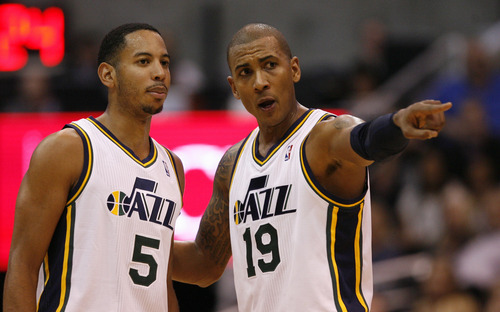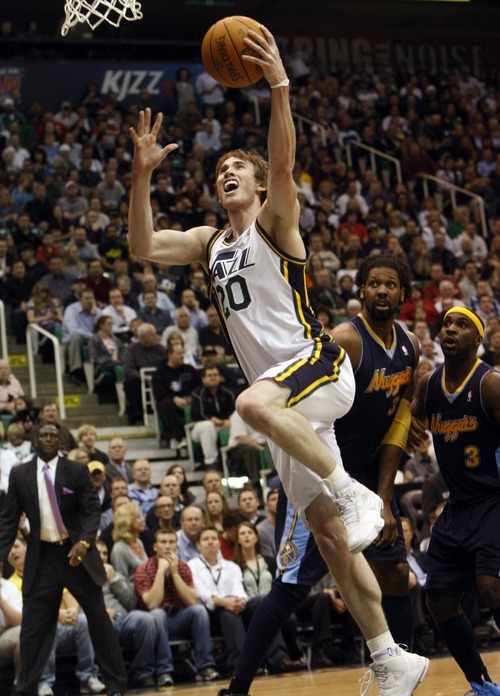This is an archived article that was published on sltrib.com in 2011, and information in the article may be outdated. It is provided only for personal research purposes and may not be reprinted.
It was the strangest, weirdest and most difficult season Raja Bell has ever known. The toughest and most trying year Paul Millsap has ever been a part of. But all the frustration, disappointment and shock that colored the Jazz's lackluster 2010-11 campaign was best captured by Utah general manager Kevin O'Connor, who summed up with a single word what it took 82 games to document: lousy.
Lousy became O'Connor's go-to term during the final weeks of the year, when the Jazz had been eliminated from playoff contention while stronger, better clubs polished their armor for the postseason. Lousy said everything about a year that saw a small-market Utah team burden itself with the fifth-highest payroll in the NBA, only to eventually collapse from the weight of expectations, abandonment and failure.
"We rolled the dice and went way out on a limb this year economically to try and do something special, and it didn't work out like any of us would hope," Jazz chief executive officer Greg Miller said.
O'Connor spent the summer leading up to a lost season attempting to glue together disparate pieces during what promised to be an unpredictable transition year. Carlos Boozer, Wesley Matthews and Kyle Korver were gone. Al Jefferson, Bell and Millsap were about to become starters. But potential and promise still surrounded a Jazz team that was led by All-Star guard Deron Williams, coached by Jerry Sloan, and coming off a gutsy run that vaulted Utah into the 2010 Western Conference semifinals.
Going farther this season was a stretch, even before dramatic change wrecked the Jazz's plans. But earning a berth to the conference finals was still a primary goal. And when Utah emerged from preseason play with a spotless 8-0 record, anything seemed possible. Soon, the Jazz were 15-5. Then 27-13. Compiling thrilling comebacks that saw Sloan maximize the talent of an uneven roster, and Williams unleash some of the best basketball of his entire career, Utah approached the midway point of the regular season gunning for home-court advantage in the playoffs.
"We were sky high," Jazz reserve center Francisco Elson said. "Everybody was calling us the comeback kids."
Hard way to fall
The kids crashed. Sloan and longtime assistant Phil Johnson resigned Feb. 10. Williams was traded Feb. 23. And while the Jazz showed serious signs of cracking prior to the trio's departure — slow starts, mounting frustration and inconsistent play topped the list — Utah spent the remainder of the season falling apart.
The Jazz set two records for futility, becoming the first team in NBA history to begin 15-5 and 27-13 and not qualify for the playoffs. Utah dropped 10 of 11 games from March 20 to April 9, while three losing streaks of at least five straight contests erased a stretch from Nov. 6 to Dec. 1 that saw the Jazz win 13 of 15.
Utah flat-lined post-Sloan. Players struggled to adapt to new roles in a new environment, while some failed to connect with Corbin. But the post-Williams Jazz were even worse. Blowouts, no-shows and the disappearance of the system that once defined Jazz ball ultimately overshadowed the rise of rookies Gordon Hayward, Derrick Favors and Jeremy Evans. The largest casualty, though: leadership.
"You can only lead as much as you're allowed to lead, and I think that's what Deron was kind of saying before he left," Bell said. "Leadership is one of those things where your heart can be in the right place and you can be doing what you think is right, and it might not be perceived like that, and it may not be allowed to happen.
"I don't know what happened with leadership this year. There were a lot of things, a lot of moving parts. A lot of people trying to figure out what their role was on the team. The deck was reshuffled."
Bell, an 11-year veteran, believes that only a few teams in the NBA could have overcome the role reversal Utah was forced to handle. And even stacked clubs such as the Los Angeles Lakers likely would have wavered under similar adversity.
"It might've just been too much for us to be successful this year," Bell said. "If you've got Hall of Famers across your roster, you might be able to overcome some of that. But I'm surely not, and the jury's probably still out on some of these young guys."
Don't look back
O'Connor chalked the lousy year up to a "tale of two seasons." When the Jazz were soaring, everything from resiliency, pride and luck lifted Utah. Williams owned crunch time, the team's second unit was a savior, and lesser-known veterans who had been ignored during The Summer of The Decision were peaking.
But when the Jazz traded Williams, they lost their closer. The shocking departures of Sloan and Johnson immediately ended 23 years of stability. And injuries soon began to mount: Mehmet Okur's comeback was a bust; Andrei Kirilenko reverted to form; Bell, Elson and Ronnie Price fell victim to the law of averages. During a season where everything had to go absolutely perfect for Utah to return to the conference finals for the first time since 2007, luck eventually ran out and reality finally set in.
The Jazz were good, not great. Take away Williams, Sloan and Johnson, then turn the picture upside down, and Utah was just average — a fact that Williams predicted when the team's slide first began.
"The little things that we did at the beginning of the year, we didn't do in the second part of the year," O'Connor said. "Our defense slipped. Our turnovers went up a little bit. And it's a fine line between doing all of that.
"I can mention eight games where we either had a chance to take or had the lead in the last minute of the game over the last 40 games, and we lost all of them."
Millsap was still shaken Thursday. Asked to look back on a lost season during which he had a career year, he refused. He would discuss the future. He would willingly open up about the promise of the Jazz's rookie trio, the potential his game still possesses, and what a full summer of preparation and an entire training camp could do for Utah in Corbin's hands.
But the day after 2010-11 ended, Millsap's bruised, bloodied, swollen right eye said it all. He had lived through and endured only the second year during the last 28 that saw the Jazz end the season as a loser. Like Jefferson, he had vowed to fight on, no matter what Utah was asked to deal with. But once 2010-11 was over, Millsap had no interest in reflecting on the collapse.
"I don't want to," Millsap said. "I'm going to ... leave it where it's at. I'm not going to look back in the past, because it's been tough. Mentally, it's been really tough for us to try and get out there and play basketball during the hard times."
bsmith@sltrib.com Twitter: @tribjazz —
Looking back
Exceeded expectations
Paul Millsap • Salt Lake City's resident iron man was the heart and soul of the 2010-11 Jazz.
Earl Watson • Proved he still has it, and was invaluable down the stretch.
Gordon Hayward • Rough start was erased by strong, confident finish.
Derrick Favors • Potential, potential, potential. Could be the real deal in a couple of years.
Jeremy Evans • Human pogo stick did more than most No. 55 picks ever do.
Middle ground
Al Jefferson • Offensive numbers were there but defense often was not. Must play bigger.
C.J. Miles • Career year, and at times Utah's top shooter. Becoming defined by inconsistency, though.
Andrei Kirilenko • Solid beginning overshadowed by another year filled with injuries.
Below grade
Raja Bell • Veteran leader struggled with his shot entire season.
Mehmet Okur • Could've been a difference-maker. Instead, he never was 100 percent healthy.
Kyrylo Fesenko • Initial improvement gave way to the same old, silly Fesenko.
Limited impact
Devin Harris, Francisco Elson, Ronnie Price, Kyle Weaver, Marcus Cousin —
Rough numbers
• The Jazz became the first team in NBA history to start 15-5 and 27-13 and not make the playoffs.
• Utah finished the season winning just 12 of its final 42 games.
• Jazz players missed 171 combined games due to either injury or illness.
• Utah began the season Oct. 27, 2010 with a starting lineup of Deron Williams, Raja Bell, Andrei Kirilenko, Paul Millsap and Al Jefferson. The Jazz finished the season April 13 with a first unit featuring Devin Harris, Gordon Hayward, Millsap, Derrick Favors and Jefferson. —
Chance for top pick
The Jazz have an 8.2 percent chance of winning the No. 1 overall pick in the 2011 NBA Draft. Utah will hold two lottery selections in the June 23 draft. A Jazz pick currently slotted sixth (from New Jersey) has a 75 out of 1,000 chance of moving to No. 1. The Jazz's own No. 12 pick has a seven out of 1,000 chance. The first three picks will be determined by lottery, while the remainder will be based on the 2010-11 records of teams slotted 4-14. The draft order will be announced May 17.





